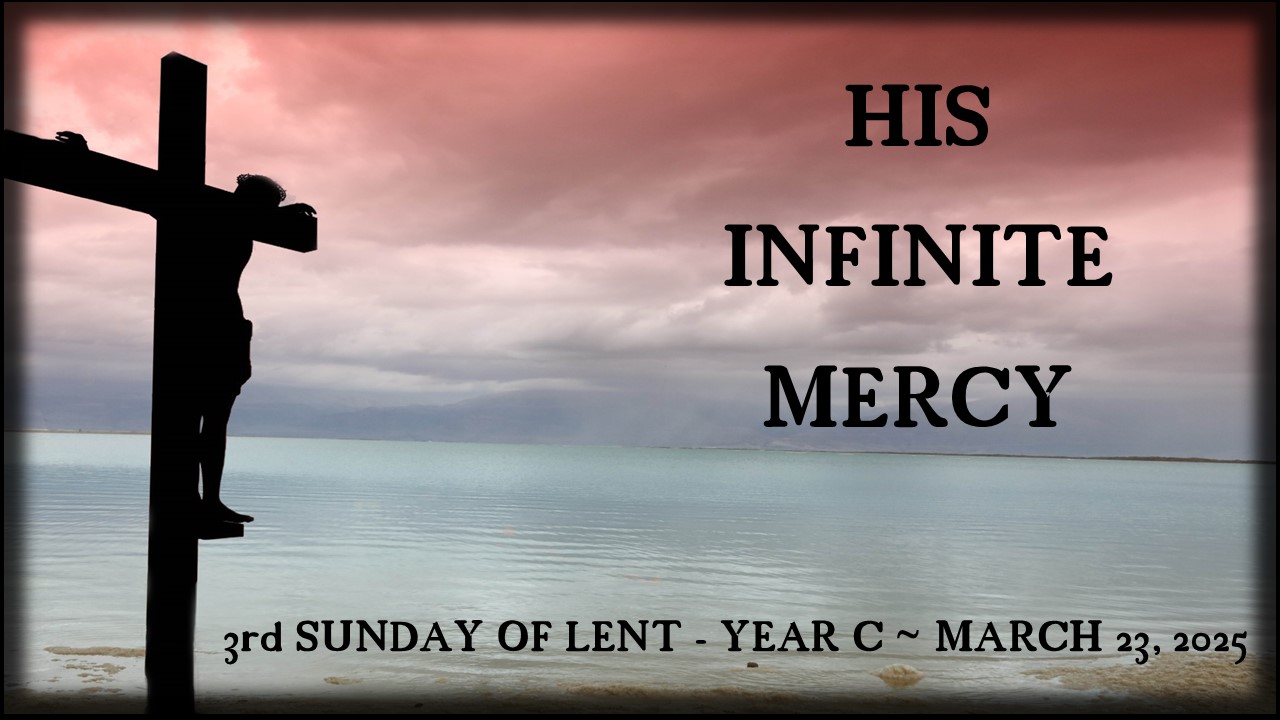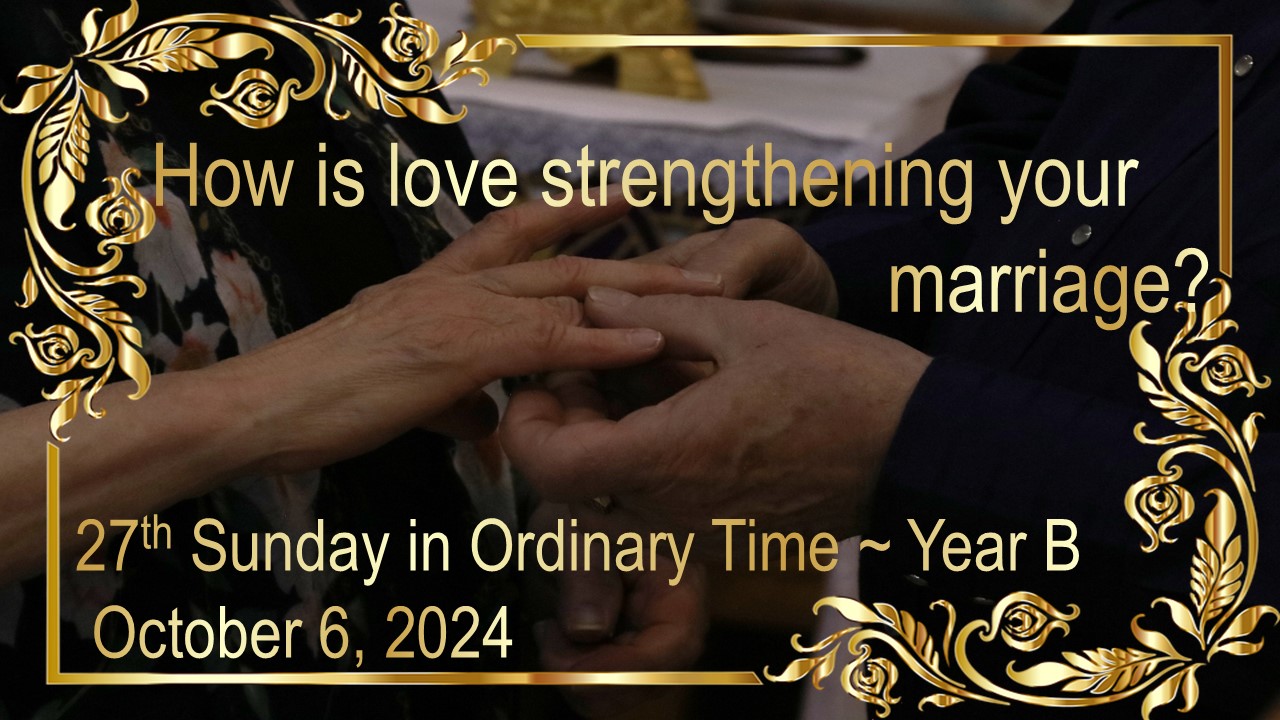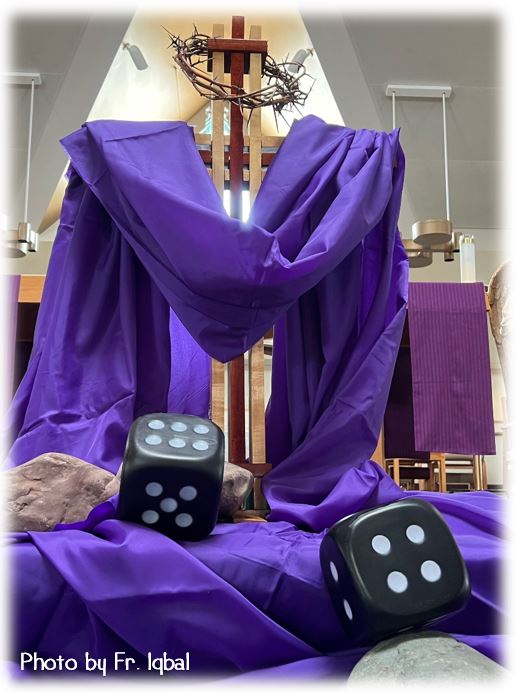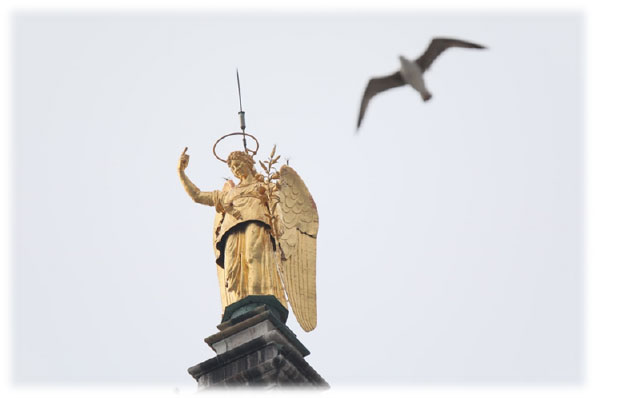
3rd SUNDAY OF LENT – YEAR C ~ MARCH 23, 2025
HIS INFINITE MERCY
On Ash Wednesday, we started our Lenten journey by receiving ashes on our foreheads to remind ourselves that we are dust and unto dust we shall return. We continue our Lenten journey as we deepen our faith and spiritual life by meditating on the Word of God. First Sunday of Lent invited us to walk with Jesus to desert (a place of emptiness and humility) as he was tempted by the devil to examine our own temptations, shortcomings and failures and learn to rise above them. On the Second Sunday of Lent we climbed the holy mountain with Jesus to experience his splendid glory (Please read 2 Peter 1:16-21) as he opened our hearts and minds to understand the true meaning of his greatest sacrifice which will never be offered again as we read in the Letter to Hebrews “ But when Christ came as a high priest of the good things that have come, then through the greater and perfect tent (not made with hands, that is, not of this creation), he entered once for all into the Holy Place, not with the blood of goats and calves, but with his own blood, thus obtaining eternal redemption. For if the blood of goats and bulls, with the sprinkling of the ashes of a heifer, sanctifies those who have been defiled so that their flesh is purified, how much more will the blood of Christ, who through the eternal Spirit offered himself without blemish to God, purify our conscience from dead works to worship the living God!” (9:11-14).
St. Irenaeus, bishop and martyr once fighting against the heresies of his time, said; “From the beginning God created man out of his own generosity. He chose the patriarchs to give them salvation. He took his people in hand, teaching them, unteachable as they were, to follow him. He gave them prophets, accustoming man to bear his Spirit and to have communion with God on earth. He who stands in need of no one gave communion with himself to those who need him. Like an architect he outlined the plan of salvation to those who sought to please him. By his own hand he gave food in Egypt to those who did not see him. To those who were restless in the desert he gave a law perfectly suited to them. To those who entered the land of prosperity he gave a worthy inheritance. He killed the fatted calf for those who turned to him as Father and clothed them with the finest garment. In so many ways he was training the people to take part in the harmonious song of salvation”.
He continues to say “For this reason John in the book of Revelation says: His voice was as the voice of many waters. The Spirit of God is indeed a multitude of waters, for the Father is rich and great. As the Word passed among all these people, he provided help in generous measure for those who were obedient to him, by drawing up a law that was suitable and fitting for every circumstance. He established a law for the people governing the construction of the tabernacle and the building of the temple, the choice of Levites, the sacrifices, the offerings, the rites of purification and the rest of what belonged to worship. He himself needs none of these things. He is always filled with all that is good. Even before Moses existed, he had within himself every fragrance of all that is pleasing. Yet he sought to teach his people, always ready though they were to return to their idols. Through many acts of indulgence, he tried to prepare them for perseverance in his service. He kept calling them to what was primary by means of what was secondary, that is, through foreshadowing to the reality, through things of time to the things of eternity, through things of the flesh to the things of the spirit, through earthly things to the heavenly things. As he said to Moses: You will fashion all things according to the pattern that you saw on the mountain. For forty days Moses was engaged in remembering the words of God, the heavenly patterns, the spiritual images, the foreshadowing of what was to come. Saint Paul says: They drank from the rock that followed them, and the rock was Christ. After speaking of the things that are in the law he continues: All these things happened to them as symbols: they were written to instruct us, on whom the end of the ages has come. Through foreshadowing of the future, they were learning reverence for God and perseverance in his service. The law was therefore a school of instruction for them, and a prophecy of what was to come”.
One rainy afternoon a mother was driving along one of the main streets of town, taking those extra precautions necessary when the roads are wet and slick. Suddenly, her son, spoke up from his relaxed position in his seat. “Mom, I’m thinking of something.” This announcement usually meant he had been pondering some fact for a while, and was now ready to expound all that his six-year-old mind had discovered. She was eager to hear. “What are you thinking?” she asked.
“The rain!” he began, “is like sin, and the windshield wipers are like God wiping our sins away.”
After the chill bumps raced up her arms, she was able to respond. “That’s really good, my son.”
Then her curiosity broke in. How far would this little boy take this revelation? So, she asked… “Do you notice how the rain keeps on coming? What does that tell you?”
He didn’t hesitate one moment with his answer: “We keep on sinning, and God just keeps on forgiving us.”
I think we should always remember this whenever we turn our wipers on. We must continually come to the Lord and seek His forgiveness.
St. Augustine reflecting on the passion of Christ says “This is generally understood of Christ, the head, as every Christian acknowledges. When day was fading into evening, the Lord laid down his life on the cross, to take it up again; he did not lose his life against his will. Here, too, we are symbolized. What part of him hung on the cross if not the part he had received from us? How could God the Father ever cast off and abandon his only Son, who is indeed one God with him? Yet Christ, nailing our weakness to the cross (where, as the Apostle says: Our old nature was nailed to the cross with him), cried out with the very voice of our humanity: My God, my God, why have you forsaken me? The evening sacrifice is then the passion of the Lord, the cross of the Lord, the oblation of the victim that brings salvation, the holocaust acceptable to God. In his resurrection he made this evening sacrifice a morning sacrifice. Prayer offered in holiness from a faithful heart rises like incense from a holy altar. Nothing is more fragrant than the fragrance of the Lord. May all who believe share in this fragrance. Therefore, our old nature, in the words of the Apostle, was nailed to the cross with him in order, as he says, to destroy our sinful body, so that we may be slaves to sin no longer”.
The holy men and women in our Christian faith are the extraordinary examples of God’s mercy and our conversion as someone said, “all saints have a past, and all sinners have a future”. I just like to share the conversion story of St. Augustine who was born in 354 A.D in Africa. His mother, St. Monica, was a devout Christian, who raised her son with a Christian education; however, he was not baptized. Augustine’s father was a pagan who did not convert to Catholicism until on his death bed and he had taught his son to be more concerned with worldly goods and pleasures. At age 16, St. Augustine stole fruit he did not want from a neighboring garden simply because it was forbidden, as described in his autobiography, The Confessions. “It was foul, and I loved it. I loved my own error—not that for which I erred, but the error.” (Confessions 2:4). St. Augustine’s friends were boys that bragged about their sexual conquests. He himself had a lover for fifteen years and fathered an illegitimate son. Throughout these experiences, St. Monica continued to pray for the conversion of her son and husband. At the age of 32, St. Augustine heard a young voice tell him to take and read St. Paul’s Epistle to the Romans. St. Augustine was converted. He received baptism from St. Ambrose, returned home, and gave all to the poor. He was consecrated Bishop of Hippo in 395.
St. Augustine’s story reminds us first and foremost, that hope is never lost. God can work and move in the most hardened of hearts for conversion, perhaps when we least expect it. All sin, no matter how grave, can be forgiven if we repent. Like St. Monica, we should never tire of praying for the conversion of family members, friends, and acquaintances just as St. Monica prayed unceasingly for the conversion of both her son and her husband. St. Monica’s prayers were eventually answered.
In the First Reading today Moses is having beautiful encounter with God in the burning bush. The close encounter of Moses with God is the beginning of his conversion as he opens his heart and mind to listen to God’s voice. God says to Moses that this hidden cry of the people has reached even up to him: He has heard, He has seen their oppression and sufferings … And He has decided to take action, sending Moses to rise and nourish the dream of freedom in the Israelites and to reveal to them that this dream is His will: to make Israel’s people free, His people, bound to him by a Covenant of love, called to witness the faithfulness of the Lord before all the people. But for Moses to be able to fulfil his mission, God instead wants him to descend with him amid the Israelites. Moses’ heart must become God’s, attentive and sensitive to the suffering and dreams of men and women, to those who cry in secret when they raise their hands towards heaven, because they have nothing else to hold onto on Earth. It is the groaning of the Spirit, and Moses must listen not with his ears but with his heart. Today we can ask ourselves, to learn how to listen with our heart. The one who teaches how to listen this way is the Spirit. He is the one who teaches us to listen with the heart. To open it. He teaches us to call God “Abba, Father”.
Cardinal John Henry Newman once talking about his conversion wrote “God has created me to do Him some definite service. He has committed some work to me which He has not committed to another. I have my mission. I may never know it in this life, but I shall be told it in the next. I am a link in a chain, a bond of connection between persons. He has not created me for naught. I shall do good; I shall do His work. I shall be an angel of peace, a preacher of truth in my own place, while not intending it if I do but keep His commandments. Therefore, I will trust Him, whatever I am, I can never be thrown away. If I am in sickness, my sickness may serve Him, in perplexity, my perplexity may serve Him. If I am in sorrow, my sorrow may serve Him. He does nothing in vain. He knows what He is about. He may take away my friends. He may throw me among strangers. He may make me feel desolate, make my spirits sink, hide my future from me. Still, He knows what He is about. We learn from Cardinal Newman to follow the words of scripture and “Always be ready to give an explanation to anyone who asks you for a reason for your hope.” (1 Peter 3:15).
God through Moses freed Israelites from the bondage of Egyptian slavery with his mighty right hand. God loves his people, and he never leaves them alone as St. Paul says “he can not deny himself” for he has written our names on the palms of his hands, and he will never forsake or forget us.
In the Second Reading St. Paul wants us to look back to our ancestors and believe that God’s mercy is needed for our conversion “Now these things occurred as examples for us, so that we might not desire evil as they did. And do not complain as some of them did and were destroyed by the destroyer”. How wonderful to believe in the mercy of God so that our hearts may be converted back to our heavenly Father? Prophet Ezekiel quoted “Now you, mortal, say to the house of Israel, Thus you have said: “Our transgressions and our sins weigh upon us, and we waste away because of them; how then can we live?” Say to them, As I live, says the Lord God, I have no pleasure in the death of the wicked, but that the wicked turn from their ways and live; turn back, turn back from your evil ways; for why will you die, O house of Israel? And you, mortal, say to your people, The righteousness of the righteous shall not save them when they transgress; and as for the wickedness of the wicked, it shall not make them stumble when they turn from their wickedness; and the righteous shall not be able to live by their righteousness when they sin. Though I say to the righteous that they shall surely live, yet if they trust in their righteousness and commit iniquity, none of their righteous deeds shall be remembered; but in the iniquity that they have committed shall die. Again, though I say to the wicked, “You shall surely die,” yet if they turn from their sin and do what is lawful and right— if the wicked restore the pledge, give back what they have taken by robbery, and walk in the statutes of life, committing no iniquity—they shall surely live, they shall not die. None of the sins that they have committed shall be remembered against them; they have done what is lawful and right, they shall surely live” (33:10-16). Also please do read (Psalm 95 & Luke 15:1-32).
The Gospel for this third Sunday of Lent speaks to us about God’s infinite mercy. In today’s Gospel passage, Jesus refers to two tragic events which had caused a stir: a cruel suppression carried out by Roman soldiers in the temple, and the collapse of the tower of Siloam in Jerusalem, which resulted in 18 deaths. Why is Jesus using these two examples? I think this could be the possible answer to these questions:
Jesus mentions the tower in Siloam in the context of answering a question about a recent tragedy in Jerusalem. Some people told Jesus about a group of Galileans (Galileans was used to refer to members of a fanatical sect (Zealots)), followers of Judas of Galilee, who fiercely resented the taxation of the Romans. Galileans was also a term used by some in the Roman Empire to name the followers of Christianity, called in this context as the Galilean faith. Judas Iscariots was also one of the Zealot members who had come to the temple to sacrifice, and Pontius Pilate slaughtered them, probably due to a public disturbance the Galileans were causing (Luke 13:1). The men who related this story to Jesus, may have been trying to lure Him into taking sides, either for or against Pilate, or they may have simply been curious about Jesus’ reaction to the massacre. Whatever their motivations, Jesus’ response was sobering: “Do you think that these Galileans were worse sinners than all the other Galileans because they suffered this way? I tell you, no! But unless you repent, you too will all perish” (verses 2–3).
Jesus continues the conversation by mentioning another current event, this one involving the tower of Siloam: “Or those eighteen who died when the tower in Siloam fell on them – do you think they were more guilty than all the others living in Jerusalem? I tell you, no! But unless you repent, you too will all perish” (Luke 13:4–5). The fall of the tower of Siloam is not mentioned in other historical records, and, since the Bible gives no more detail of the structure’s collapse, we cannot be sure what the tower was for or why it fell. The tragedy was obviously well-known to Jesus’ hearers. Siloam was an area just outside the walls of Jerusalem on the southeast side of the city. A spring-fed pool was there, which was the scene of one of Christ’s miracles (John 9). The tower of Siloam may have been part of an aqueduct system or a construction project that Pilate had begun. In any case, the tower fell, and eighteen people were killed in the catastrophe.
Jesus is aware of the superstitious mentality of his listeners, and he knows that they misinterpreted that type of event. In fact, they thought that, if those people died in such a cruel way it was a sign that God was punishing them for some grave sin they had committed, as if to say, “they deserved it”. Instead, the fact that they were saved from such a disgrace made them feel “good about themselves”. They “deserved it”; “I’m fine”.
Jesus clearly rejects this outlook, because God does not allow tragedies to punish sins, and he affirms that those poor victims were no worse than others. Instead, he invites his listeners to draw from these sad events a lesson that applies to everyone, because we are all sinners; in fact, he said to those who questioned him, “Unless you repent you will all likewise perish”. (Please read Ezekiel 33 chapter)
Today too, seeing certain misfortunes and sorrowful events, we can be tempted to “unload” the responsibility onto the victims, or even onto God himself. But the Gospel invites us to reflect: What idea do we have of God? Are we truly convinced that God is like that, or isn’t that just our projection, a God made to “our image and likeness”?
Jesus, on the contrary, invites us to change our heart, to make a radical about-face on the path of our lives, to abandon compromises with evil – and this is something we all do, compromises with evil, hypocrisy…. I think that nearly all of us has a little hypocrisy – to decidedly take up the path of the Gospel. But again, there is the temptation to justify ourselves. What should we convert from? Aren’t we basically good people? How many times have we thought this: “But after all I am a good person” … isn’t that true? “Am I not a believer and even quite a church goer?” And we believe that this way we are justified.
There is a little story from St Thérèse of the Child Jesus, when she prayed for that man who was condemned to death, a criminal, who did not want to receive the comfort of the Church. He rejected the priest, he didn’t want forgiveness, he wanted to die like that. And she prayed in the convent, and then, at the moment of his execution, the man turned to the priest, took the Crucifix and kissed it. The patience of God! He does the same with us, with all of us. How many times, we don’t know the Lord saves us because he has great compassion for us. And this is his mercy. It’s never too late to convert, but it’s urgent. Now is the time! Let us begin today.
Let me conclude my reflection with this story by an unknown author which will always help us to understand that when we believe in the mercy of God, we are able to see everything clearly despite our burdens in life.
Brenda was a young woman who was invited to go rock climbing. Although she was scared to death, she went with her group to a tremendous granite cliff. Despite her fear, she put on the gear, took a hold of the rope, and started up the face of that rock. Well, she got to a ledge where she could take a breather. As she was hanging on there, the safety rope snapped against Brenda’s eye and knocked out her contact lens. Well, here she is on a rock ledge, with hundreds of feet below her and hundreds of feet above her. Of course, she looked and looked and looked, hoping it had landed on the ledge, but it just wasn’t there. Here she was, her sight now blurry. She was desperate and began to get upset, so she prayed to the Lord to help her.
When she got to the top, a friend examined her eye and her clothing for the lens, but there was no contact lens to be found. She sat down, despondent, with the rest of the party, waiting for the rest of them to make it up the face of the cliff. She looked out across range after range of mountains, thinking of that Bible verse that says, “The eyes of the Lord run to and fro throughout the whole earth.” She thought, “Lord, You can see all these mountains. You know every stone and leaf, and You know exactly where my contact lens is. Please help me.”
Finally, they walked down the trail to the bottom. At the bottom, there was a new party of climbers just starting up the face of the cliff. One of them shouted out, “Hey, you guys! Did anybody lose a contact lens?” Well, that would be startling enough, but you know why the climber saw it? An ant was moving slowly across the face of the rock, carrying it. Brenda told me that her father was a cartoonist. When she told him the incredible story of the ant, the prayer, and the contact lens, he drew a picture of an ant lugging that contact lens with the words, “Lord, I don’t know why You want me to carry this thing. I can’t eat it, and it’s awfully heavy. But if this is what You want me to do, I’ll carry it for You.”
I think it would probably do some of us good to occasionally say, “God, I don’t know why you want me to carry this load. I can see no good in it and it’s awfully heavy. But if you want me to carry it, I will.” God doesn’t call the qualified, He qualifies the called.
How do we experience his infinite mercy in our life?
Other Sermons In This Series

27TH SUNDAY IN ORDINARY TIME YEAR B ~ OCTOBER 6, 2024
October 03, 2024

1st Sunday of Lent – Year C – March 6, 2022
March 04, 2022

He Protects Us | November 14, 2021
November 14, 0201

